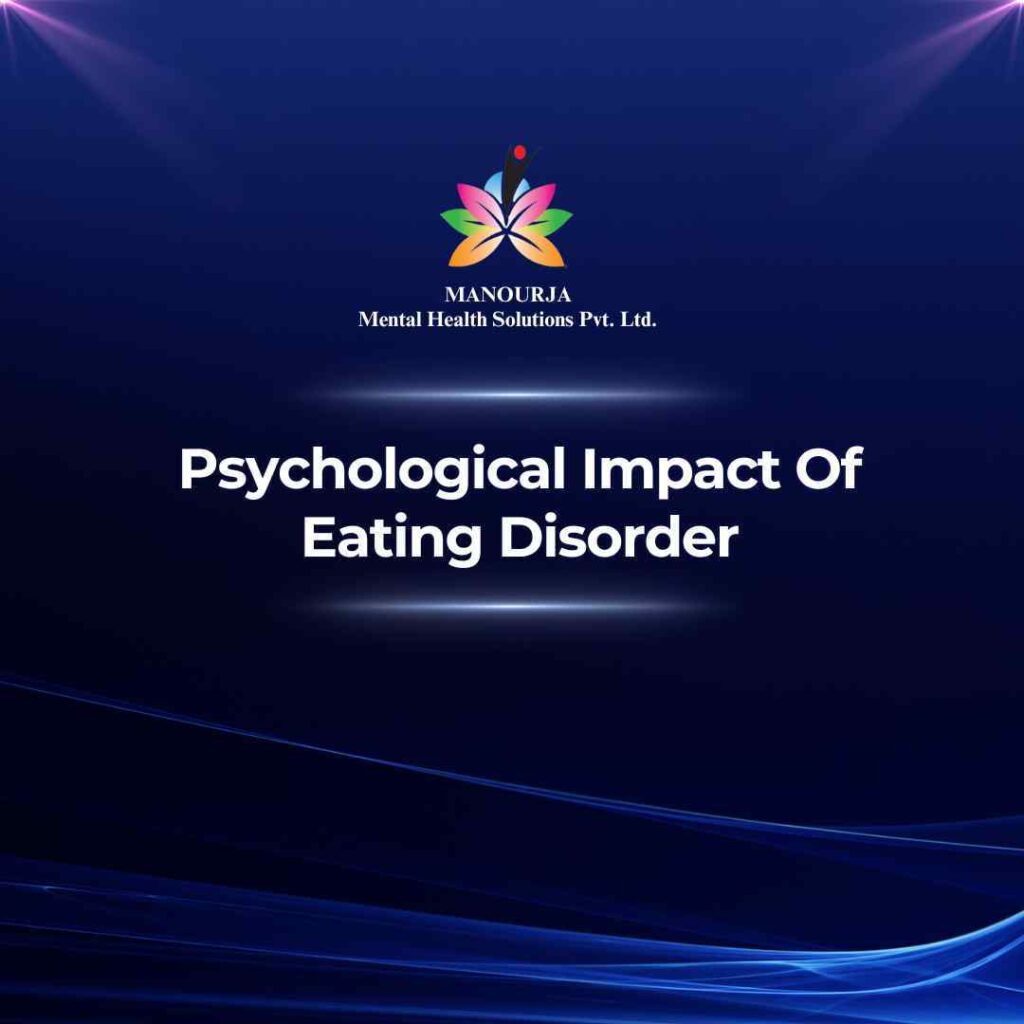Psychological Impact of Eating Disorder

Eating disorders profoundly affect psychological well-being, often resulting in a range of symptoms that can affect every day functioning and overall mental health. Here’s a detailed look at the psychological impact of eating disorders:
Distorted Body Image
A hallmark of most eating disorders is a severely distorted body image. Individuals may perceive themselves as overweight even when they are underweight, leading to obsessive thoughts about body weight, shape, and appearance. This distortion can drive unhealthy behaviors aimed at controlling weight and can persist even after significant weight loss.
Low Self-Esteem and Self-Worth
Eating disorders are often associated with low self-esteem and feelings of worthlessness. The individual’s sense of self-worth may become overly dependent on their body shape and weight, and any perceived failure to control these aspects can lead to intense feelings of shame and guilt.
Depression and Anxiety
There is a high comorbidity of depression and anxiety with eating disorders. The isolation, social withdrawal, and chronic stress associated with managing an eating disorder can contribute to depressive symptoms. Anxiety can be particularly pronounced around mealtimes or when faced with situations that involve food.
Obsessive-Compulsive Behaviors
Many individuals with eating disorders display behaviors that have an obsessive-compulsive nature, such as ritualistic eating patterns, excessive calorie counting, and compulsive exercising. These behaviors are often attempts to manage overwhelming feelings of anxiety related to food and body image.
Emotional Instability
Mood swings and emotional instability are common, partly due to malnutrition and the psychological stress of living with an eating disorder. Individuals may experience rapid shifts in mood, from irritability and sadness to intense anxiety or euphoria, particularly surrounding issues of food and body image.
Impaired Cognitive Function
Eating disorders can lead to cognitive impairments, including difficulty concentrating, slowed thinking, and indecisiveness. The brain may be particularly affected by inadequate nutrition, which can impact cognitive processes and exacerbate feelings of confusion and indecisiveness.
Social Anxiety and Paranoia
The intense fear of being judged by others can lead to social anxiety and paranoia, especially in situations involving eating in public or exposing one’s body, such as at a swimming pool or beach. This anxiety can limit social interactions and lead to further isolation.
Feelings of Isolation
Due to the secretive nature of their behaviors, individuals with eating disorders may isolate themselves from friends and family. This isolation can exacerbate other psychological symptoms, such as depression and anxiety, creating a cycle that is difficult to break without professional help.
Suicidal Thoughts
In severe cases, the distress and despair caused by living with an eating disorder can lead to suicidal thoughts or behaviors. The risk is higher among individuals with eating disorders than in the general population, particularly in those with co-occurring mood disorders or substance abuse problems.
The psychological impact of eating disorders underscores the need for comprehensive treatment that addresses both the mental and physical aspects of the disorder. Treatment typically involves psychotherapy, such as cognitive-behavioral therapy (CBT) or dialectical behavior therapy (DBT), nutritional counseling, and sometimes medications to manage symptoms of depression and anxiety. Social support from family and friends, along with professional guidance, is crucial in helping individuals recover from an eating disorder and rebuild their mental health.
At MANOURJA, we believe in the transformative power of counseling. Our experienced therapists offer a safe and supportive space where you can explore your thoughts, emotions, and challenges. Through personalized counselling sessions, we’ll work together to develop coping strategies, build resilience, and achieve lasting positive change. Discover the path to a healthier, happier you with MANOURJA counselling services.
MANOURJA Rehabilitation Services
At MANOURJA, we’re dedicated to helping you in rebuild your life, after difficult times. Our rehabilitation services focus on understanding what you need to move forward, whether you’re recovering from addiction, trauma, or any psychological – social challenges. We create personalized plans, that are all about helping you, regain your strength and find hope again. With a caring team by your side, you’ll have the support to make real progress and take steps toward a brighter, healthier future.
